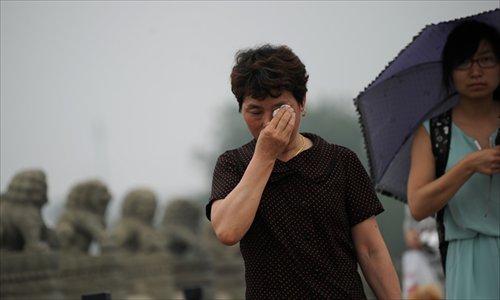History denial intolerable: Xi
Highest-level commemoration of Japanese invasion ever

A woman reacts as she visits Lugou Bridge, or the Marco Polo Bridge, in west Beijing on Monday, the 77th anniversary of an all-out Japanese invasion of China. Chinese President Xi Jinping attended a commemoration event at a museum near the site. Photo: AFP
Top Chinese leaders urged remembrance and underscored the immutability of history as they commemorated the 77th anniversary of the July 7 Incident that marked the beginning of the War of Resistance against Japanese Aggression (1937-45).
In attendance at the high-level commemorative service Monday were Chinese President Xi Jinping, top political advisor Yu Zhengsheng and over 1,000 government officials and representatives from all walks of life. The memorial was held at a museum near suburban Beijing's Lugou Bridge, also known as the Marco Polo Bridge, close to the spot where Japanese troops started all-out war on China.
"Anyone who intends to deny, distort or beautify the history of aggression will never be tolerated by Chinese people and people of all other countries," said Xi, referring to widespread concerns that Japan is trying to distort the history of the war.
The commemoration, said Xi, is intended to remember history, memorize martyrs, and firmly safeguard world peace by using the past as warning to those in the future.
This is the first time the July 7 anniversary has been marked on such a grand scale. Analysts said that while remembering the past is important, the event also serves to send a warning signal given the current Northeastern Asia situation.
Chinese Premier Li Keqiang also urged remembrance of history as he attended a joint press briefing with German Chancellor Angela Merkel.
"The future can be embraced and peace can be maintained only if lessons from history are kept in mind," Li said.
The leaders' remarks come after Japanese Prime Minister Shinzo Abe's cabinet endorsed a reinterpretation of its Pacifist Constitution on July 1 for the right to collective self-defense, fueling concerns that Japan will return to its past militarism.
Xi's speech again clarifies China's tough stance against Japan's moves, said Ling Xingguang, director of the Tokyo-based Sino-Japanese Relationship Institute.
Xi hinted at, but did not name Abe's moves in the speech, which leaves some leeway for Chinese leaders to push for Abe's policy changes, Ling said.
"It's a pity that a small minority of people still ignore iron-clad history and the fact that tens of millions of innocent people lost their lives," Xi said in his speech.
Taiwan leader Ma Ying-jeou also visited a monument which marks victory in World War II at Zhongshan Hall in Taipei. He said that past mistakes could be forgiven but the truth could not be forgotten.
Ma said the war launched by the Japanese was one of national humiliation for the Chinese. He reminded Chinese people not to forget that the Diaoyu Islands were among the first territory taken by the Japanese.
Previously, Japanese right-wingers launched a series of provocations, from the "nationalization" of China's Diaoyu Islands by the former Japanese government to Abe's visit to the controversial Yasukuni Shrine.
Ling said that under the policies of Abe's cabinet, voices calling for a friendly Sino-Japanese relationship have been few and far between.
However, some Japanese media have recently started to call for serious improvements to diplomatic relationships with China and South Korea through policy shifts, said Ling.
"The latest boost in cooperation between China and South Korea marked by Xi's visit to Seoul made a considerable impact on Japan. Xi's unprecedented presence at the commemoration also exerts pressure on Abe. We hope these influences will strengthen the friendly voices," he said.
Many people in Japan agree that commemorating the anniversary is necessary.
Masafumi Takashima, member of Kanagawa Prefecture Japan-China Friendship Association, said that it's necessary for China to hold such a high-profile event to promote peace.
"Many Japanese today don't know about this day. They should be reminded how the war started, especially as the current Japanese government shows signs of a return to militarism," he said.
A number of college students in Tokyo told the Global Times that they did not know of the anniversary.
Takashima, 83, said he was influenced by militarism when younger, but he later converted to pacifism after Japan's defeat.
Kenichi Miura, 50, a Japanese actor based in China for nearly 10 years, said that he does not agree with Abe's government. Reflecting on World War II and commemorating those who have sacrificed is very important, but maintaining peace is more important, he said.
In the last week, China has released a raft of never-before seen war-related materials.
Footage of the Japanese surrender to China in 1945 was for the first time released by the memorial hall of the victory of the resistance war in Zhijiang, Hunan Province.
The core area of the site of Japan's notorious Unit 731 in Northeast China's Harbin will also be open to the public in 2015, said museum curator Jin Chengmin.
Unit 731 was the nerve center of Japan's biological warfare in China and Southeast Asia during World War II. Jin told the Global Times that more South Koreans and Japanese visit the site now. The museum is an important reminder to promote peace, he said.
China's State Archives Administration on Monday released the confession of Japanese war criminal Tsutomu Nagashima, the latest in a series of similar publications that started Thursday.
Japanese troops under the command of Tsutomu Nafashima conducted 15 battles of all scales, killing 1,660 troops and 970 civilians from April 1942 to July 1945.
Chang Meng and Sun Xiaobo contributed to this story
More in Daily Special: First shot of Japanese invasion rings in China, 77 years later